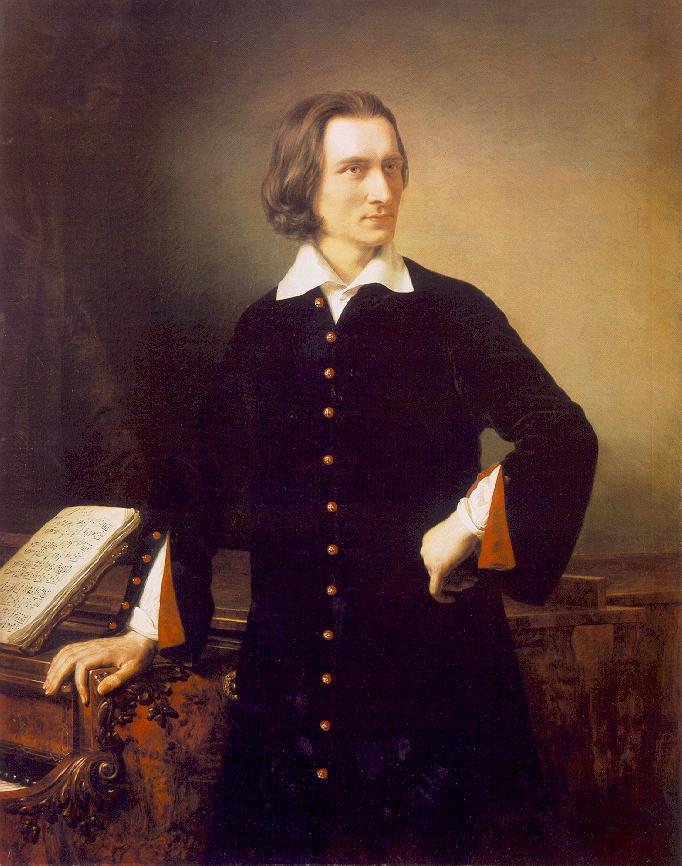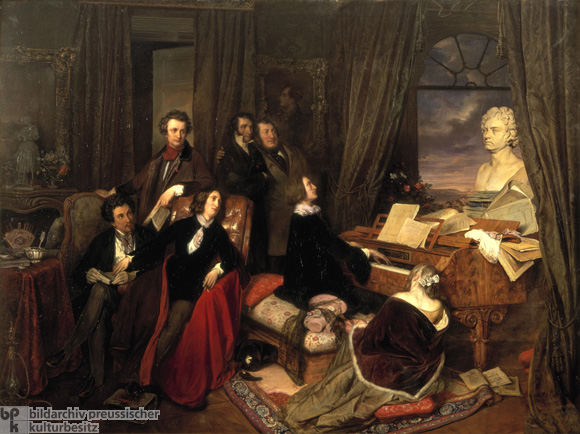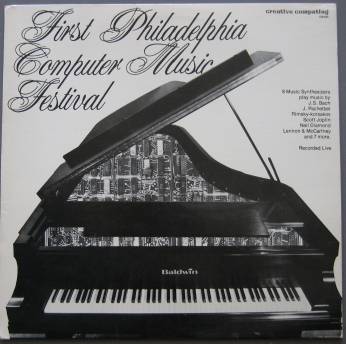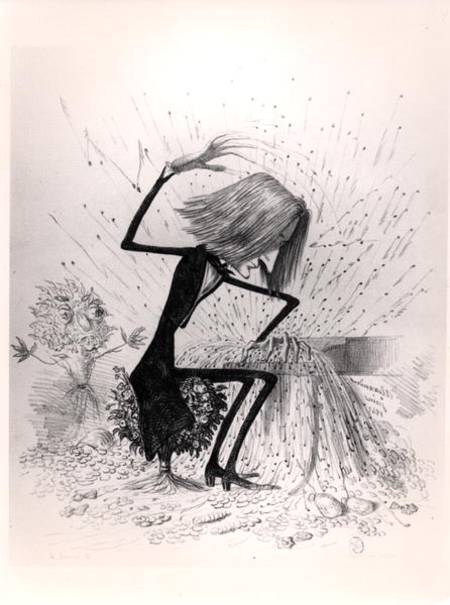Call it the revolution of the cyborg symphonies. Its algorithmic composition. As Duke Ellington said, ”It don’t mean a thing if it ain’t got that swing”, but the digital world is getting very close. ”Cope has been writing software to help him compose music for 30 years, and he long ago reached the point where most people can’t tell the difference between real Bach and the Bach-like compositions his computer can produce. Audiences have been moved to tears by melodies created by algorithms. And yet, it’s not exactly that Cope has created a computer than can write music like a human. The way he sees it, it’s that humans compose like computers.”

Liszt.1847. Barabas Miklos
If Chopin and Liszt were composing today would they would they be creating computer programs that would write works of classical music? Would they have acknowledged the coming obsolescence of human composers and the ability to move an audience to tears based on melodies created by algorithms? Its an interesting conjecture, but not one to put beyond Liszt who certainly understood how composing works; enough to create a data base model . Many would find this theory of composing distasteful, and heretical since it defies all existing conventions. But in 1852, it probably just a distant twinkle in Liszt’s wandering eyes…
Musicians do not often write well about music. Their own language is so rich that they do not feel happy using the written word. Prose to them is well, prosaic. True, Richard Wagner issued a number of thundering manifestoes in C major, and Berlioz poured out some of his extra energy in extravagant prose, but they seem to be difficult to read today; while the columns that Debussey wrote are unexpectedly acid, though not unexpectedly witty; there are relatively few pages that can be read without rueful amusement or sympathetic distress.
Also, a composer very seldom writes about other composers. His own mission fills his mind. How can he estimate another man’s success when he is trying to build his own? How can he give ear to the stranger’s message before he has uttered his own gospel? Sometimes though, a composer will show his understanding of a colleague’s work by performing it as a soloist, or by conducting it in an orchestral presentation, or, as a particularly graceful compliment, by writing a series of variations upon one of its themes. Thus, Rachmaninoff, a rather forbidding introvert, gave a number of Scriabin recitals to help the widow after Scriabin’s early death, and honored Kreisler with elegant transcriptions of Liebesleid and Liebesfreud.
For all his brilliance and for all his exhibitionism, Franz Liszt was unexpectedly and charmingly modest when he dealt with other musicians. He was himself a remarkable composer. His most distinguished pieces survive with almost undiminished vitality; the form which he virtually invented , the symphonic poem, was a profound stimulus to his successors; and in his later work there are astonishing anticipations of modern experiments in tonality. Yet he was phenomenally generous in acknowledging the achievements of other music makers: Bellini, Berlioz, Schumann, Schubert, Wagner, Borodin, and above all Chopin.

Franz Liszt (1811-1886), Hungarian composer and pianist, plays for Alexander Dumas (the Elder), Aurore Dupin (George Sand), and the Countess Marie d'Agoult (all seated), Hector Berlioz, Niccolò Paganini,....
….”Cope built a huge database of existing music, beginning with hundreds of Bach chorales that he tediously coded by hand. (Each note is given five values: pitch, duration, volume, when it appears in the piece, and which voice or instrument is making it.) The software then did essentially the same thing any complex computer model does: It scoured huge amounts of data by breaking them up into manageable chunks—in this case, short passages from the chorales—and looked for patterns. It then altered and recombined bits and pieces into new works that fit the patterns it had found. “It was an analytical problem more than a composing problem,” Cope said. Before long, the program could compose mediocre Bach-like works. It was a start.”….
Ingrained thinking holds that art is an art and not a science. A talent like Liszt understood the mathematical basis of composition, and in terms of composition, all bits of melodies can be regarded as being equally ”good” with socialization accounting for popularity. The implication being that pure creation of music, simply does not exist.The musical tradition shows plenty of evidence that composers often use strikingly identical melodies.
…Chopin and Liszt are a special case of a curiously paired phenomenon which appears sometimes in literature, often in painting and music. First comes a creator, and then a younger rival who starts by emulating and adapting, and at last stands out as a creator on almost the same level. At given times there have been Wagner and Sibelius, Debussey and Ravel, Stravinsky and Prokofiev. But seldom has the pair been so close and sympathetic as Chopin and Liszt. Liszt constantly expressed admiration for Chopin, reviewing his concerts, performing his works, writing transcriptions of his songs, and carrying forward his musical ideas; while Chopin said he wished he could ”steal” Liszt’s art of playing his ”Etudes”.
Liszt is one of the few creative musicians who has ever written a book about another. In 1852, three years after Chopin’s death, he published a biographical sketch of his friend. It is not a typical biography. It is a Rhapsody on the Theme of Chopin. This however, is in poetic prose, and it is not all by Liszt. Always generous in accepting collaboration, and always amorous, he evidently allowed some of it to be written or suggested by his mistress, Princess Carolyne of Sayn-Wittgenstein, a Polish lady of exuberant temper and passionate patriotism. To her, or to her influence over him, we owe long passages of wild and whirling words, like this desription of George Sand listening to Chopin:

''The office looks like the aftermath of a surrealistic earthquake, as if David Cope’s brain has spewed out decades of memories all over the carpet, the door, the walls, even the ceiling. Books and papers, music scores and magazines are all strewn about in ragged piles. A semi-functional Apple Power Mac 7500 (discontinued April 1, 1996) sits in the corner, its lemon-lime monitor buzzing. Drawings filled with concepts for a never-constructed musical-radio-space telescope dominate half of one wall. Russian dolls and an exercise bike, not to mention random pieces from homemade board games, peek out from the intellectual rubble. Above, something like 200 sets of wind chimes from around the world hang, ringing oddly congruent melodies.''
”She brought to her full listening the full power of her ardent genius, which had the rare quality, reserved only for a few elect, of perceiving beauty in any form of art and nature, a quality that might be that second sight, the superior gifts of which all nations acknowledge in women who are inspired. An entranced stare enables their vision to penetrate the bark, the covering, the coarse wrapping of form and permits them to glimpse in its invisible essence, the soul there incarnated, the ideal that the poet and artist have conjured up under the swirl of notes or layers of color, the folds of marble, the shaping of stone, or the mysterious rhythms of verse. it is a quality dimly apprehended by most; its supreme manifestation….”

This site features the full audio from the rare LP record First Philadelphia Computer Music Festival, published by Creative Computing in 1979. The First Philadelphia Computer Music Festival was held August 25, 1978 as part of the Personal Computing '78 show.
Yet even these outpourings do at least give us the mystical atmosphere in which Chopin and Liszt often wrote, and which they in some measure converted to music. And elsewhere in the biography, whether from the pen of Liszt or from his Polish lady, there are facts and descriptions of great interest. There is an evocation of a party where Chopin was host, and played his own music to Heine, Delacroix and the great Polish poet Mickiewicz.
There is an account of Chopin’s training. His first teacher, Zywny, was a devout admirer of Bach, which helps to explain why Chopin published a book of twenty-four preludes in all the major and minor keys, and why he often prepared for a recital by playing the ”Well-tempered Clavier”; and it was Prince Anton Radziwill, whose family once owned 800,000 serfs and had jeweled harnesses for the horses, who paid for Chopin’s entire education; through an intermediary to spare him the embarrassment. Did all all these artists at the end of the golden age of classical music realize the extreme similarities in their work; the number of notes and keys being finite:
”But Cope makes a convincing case that Mozart, in turn, may well have heard something like it and stored it away. In other words, great melodies (to our Western ears) are products of evolution, not creationism. Even if Mozart never heard the precise melody, he surely heard similar riffs that his mind, which was constantly recombining bits and pieces of his database, stuck together to make the final product. Cope has another program, called Sorcerer, that can scan a piece, compare it to various databases, and look for similar passages in earlier works. Positive matches appear more often than you’d like.”
…A beautiful and original passage in the biography is a wonderful description of the ”polonaise”, a magnificent procession danced through the great rooms, the galleries, and the gardens of a noble house, and of the mazurka, a gay flirtation combining hopeful challenge and melancholy renunciation, amorous simplicity with subtle paradoxical wit. As it should be, the book ends with the death scene. Like Keats, Chopin was one of those artists who feel themselves inescapably destined for an early death. His faithfulScottish pupil, Jane Stirling, did nothing to delay it, by persuading him to visit her native land and play his music in the dank mists and dour streets of Glasgow and Edinburgh. The description of his last illness is touching and memorable. He expressly asked to be buried beside Bellini, and to have Mozar’s ”Requiem” sung at his funeral.
A sad life: romantic but without the strength for rapture; sensitive, but without the ruthlessness of Byron or the bravura of Berlioz. Yet, because Liszt was Magyar and his collaborator Polish, it plays down one aspect of his character and his art. Chopin wrote Polish music , but he also wrote French music. Sometimes his work has the nostalgic melancholy the Poles call ”Zal”, and sometimes the swirling energy of the Slavic dances; but often it has the reticence of the well-bred Frenchman. His mother was Polish, but his father was French; he was born near Warsaw, but he died in Paris.
”But as a recent Miller-McCune profile of Cope notes, the field of “artificial creativity,” an offshoot of AI research, is only just getting on its feet. (Other “AC” researchers are working on programs to paint pictures, write jokes, and tell stories.) Yet even at this early moment in AC research, Emily Howell is already a better composer than 99 percent of the population. Whether she or any other computer can bridge that last 1 percent, making complete works with lasting significance to music, is anyone’s guess.”







 COMMENTS
COMMENTS